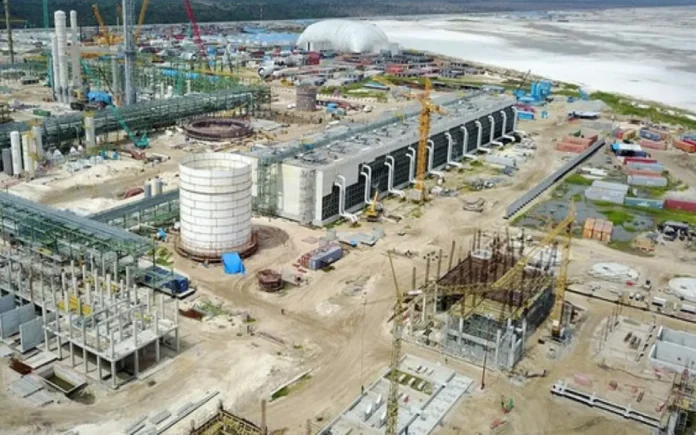By Basil Okoh
The Trade Union Congress (TUC) of Nigeria has found a way to loop into the epochal trade dispute between NUPENG, PENGASSAN and the Dangote Refinery. Dangote Refinery is the single biggest private sector investment in the history of Nigeria, no question. The Refinery has come to dominate the entire downstream sector of the oil industry in Nigeria as its success or failure will affect every Nigerian life and business going into the future.
So for the trade unions, Dangote Refinery represents the biggest pie in the Nigerian economy and their success or failure to get a foothold and control its distribution network is a matter of survival for the Unions. Being the only Refinery working in Nigeria, the Unions must get their fangs into the Dangote gravy tray or suffer atrophy and die.
Dangote is no fool not to know that NUPENG’s attempt to unionize Dangote Refinery distribution system is to make stupendous money for itself and achieve control over its truck drivers and it’s distribution logistics which then can be easily disrupted and sabotaged. The ploy is to not only enrich union leaders who have no stake in building the Refinery but also to award them a chokehold over the entire distribution machinery. So Dangote must determine for its survival and independence that this gambit must not be allowed to succeed. Such control by NUPENG and PENGASSAN are at the heart of the failure of Government Refineries. Salaries are still being paid by the failed refineries and the unions are still collecting check-off dues decades after production stoppage and business failure.
If the trade unions lose the fight to get into Dangote Refinery, and fail to seize its distribution network, trade unionism in the oil industry will face dire straits in Nigeria. The Unions know that the failure of Government investments in the oil industry has loosened the influence of unionism in the sector and that the glory days of unions will be getting over as it becomes harder to hold private investors to tolerate and respect unionism as did the government.
It is hard to see how Aliko Dangote will be blackmailed to submit to the Unions when he can easily close the valves of his supply pipes and the entire nation chokes for lack of fuel. The nation now knows that Trade Unionism in the modern era is big business and that the unions are pursuing group interest without a care of service to the nation. Trade Unions have always found a way to hold the Nigerian government by the balls, sometimes through brigandage and the resulting trade offs have always paid off to the union officials. Not so now the private sector. It started with the new generation banks who stoutly refused the unionization of their workers. The belief now is that unions are too disruptive to business and they serve only the financial interest of the union leaders.
Trade Unionism in Nigeria is as opaque and corrupt as the country that breeds it. The Trade unions loss of the fight to unionize the new generation banks revealed that big businesses can thrive and care for its workers without the disruption of unions. Nigerians can see how successful many of the new generation banks have been without unionization. Unions only serve the financial interest of its leaders.
Petroleum, the single biggest money pot of the Nigerian economy will remain the major driver of the economy for a long time and the unions are fighting hard not to be pushed out of the field of play. The attempt to build Labour Unionism into the fabric of national politics has always been sabotaged by the establishment and by former labour leaders who have their interests in other partisan groups. These past leaders of labour unions take sides with establishment politicians whose politics run counter to the policies and ideologies of labour unionism.
Labour movements across the world always identifies as vanguards of the moderated socialist movements. The beliefs and ideologies of the left make them direct enemies and opponents of the capitalist system which is manifesting right now in Nigeria with the fight between Dangote and the Unions.
It is for the same reason that the Labour movement fought so ferociously with the entrenched capitalist system in America and much of the capitalist world to establish dominance but failed in the end. American labour unionism was defeated by the nascent capitalist establishment in the first three decades of the twentieth century. In Britain, the Labour movement was able to transmute into a political party and moderate both its tirades and demands but not so easily in France. In Germany, the rise of nationalism fused with Hitler’s histrionic authoritarian ambitions to create the totalitarian state, all of which arose from Germany’s defeat in the first World War and the imposition of reparation payments by the League of Nations.
Russia did not get into the fancy business of separating the labour movement from the demand for a socialist state and so the Bolsheviks shot their way to power by first embarking on the mass murder of the Czar and his family in 1917. The Chinese were more concerned about the bread and butter issues of their people and their liberation from the imperial jackboots of the Japanese. There was no time or space to bother about the fine distinction between communism and the labour movement.
So while Chiang Kai Chek and Mao tse Tung shared common goals of fighting off the Japanese from Chinese territory, division came after the defeat of imperial Japan and chasing them out of China, over who rules the Chinese territory after the departure of the Japanese. Of course there was no chance of the capitalism oriented Chiang Kai Chek and the revolutionary Mao tse Tung finding common grounds in China and so in the heat of the internecine civil war that followed, Chek with the far weaker army was defeated and fled to the Chinese territory of the island of Formosa in 1949, and renamed it Taiwan. Neither the Communist Party nor Chek’s Republicans of Taiwan have given up claims of representing the entire Chinese territory. And in neither country did the labour movement achieve any headway.
In the decades of the twentieth century, the world labour movements have taken beatings from every side of the political spectrum. and the labour movement itself has managed to infuse socialist doctrines and programs to moderate exploitative capitalist policies and practices. These socialist influences have ameliorated the most abusive capitalist dogma and made them more tolerable. So also has the most hardened communist nations embraced democratic practices, adopting capitalist policies to lead economic development a la China.
America remains a good example of countries where the labour movement has forced changes in political thinking and economic choices and policies. The Labour movement in America at a time coalesced into a few behemoth conglomerates like AFL-CIO, NEA (National Education Association), AFT (American Federation of Teachers), The International Brotherhood of Teamsters etc and they became so big and powerful that they could force changes in national politics in the USA. Labour Unions influenced the enactment of anti-trust laws, mergers, laws on civil rights, inheritance laws and particularly the idea of minimum or living wages.
But while the Nigerian Labour movement have had a few wins after the 1945 nationwide industrial strike that resulted in the granting of COLA (Cost of living allowance), it has mostly played the copycat to developments in the rest of the world. It failed most outrageously to be a resolute part of the independence movement. Its confrontations with government in the long periods of military rule won a few successes but the period was dominated by Union betrayals and compromises as union leaders were bribed off their demands and cajoled into compromises. This practice continues to this day and the result has been that the nation does not have trust for the union leaders anymore.
It is to be expected that in any possible meeting with the unions, Dangote Refinery representatives cannot match the skill and sophistry of union leaders in negotiations. They are so well trained at the International Labour Institute run by the ILO and honed by the vagaries of the Nigerian work environment and so clobber government representatives any time they meet for negotiations.
In the absence of serious anti-monopoly laws in Nigeria, it is hard to imagine a path to victory for the Labour Union’s PENGASSAN and NUPENG in the fight with Dangote Refinery. Government has no overriding interest to force the unionization of Dangote Refinery and the Unions themselves cannot fight through the gates to physically move in and force the unionization of workers. The unions have lost public support for their case and have neither the courts nor the government on their side.
In real fact, Dangote Refinery opened shop just in time to save the Bola Tinubu government from collapse. Instead of being grateful, government is now jealous of Dangote’s dominance in the petrol refining and distribution sector. This is why government has been ambivalent in its handling of the dispute between Dangote Refinery and the trade Unions. It survives and thrives on the role Dangote Refinery is playing to keep petroleum products supplied to the nation and arresting the restive political situation but feels its hegemony over the industry has slipped and wishes to have control over Dangote Refinery.
Dangote Refinery without a doubt, holds all the aces in an industry that has been abused to the death by government and all the players including the Labour Unions. This crisis is a test as Dangote Refinery is on a historic battle for the validation of its independence from both government and the unions as it sets the precedence for future investors to follow. More and more, the petroleum industry will be dominated by private investors who will pay little heed to the government and the Labour Unions in Nigeria.
@basilokoh.






















